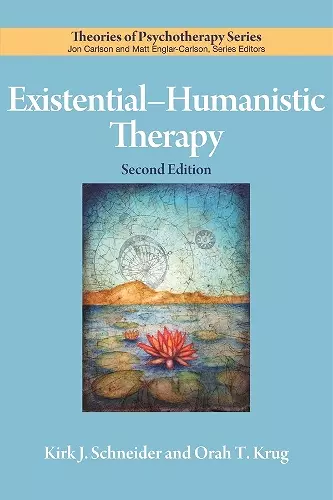Existential–Humanistic Therapy
Kirk J Schneider author Orah T Krug author
Format:Paperback
Publisher:American Psychological Association
Published:19th Jun '17
Should be back in stock very soon

This second edition provides an updated introduction to the theory, history, research, and practice of existential-humanistic therapy, which merges existential philosophy with humanistic psychotherapy, along with recent trends in existential-integrative therapy.
Existential-humanistic therapy melds European existential philosophy, which values self-inquiry, struggle, and responsibility, with the American tradition of spontaneity, optimism, and practicality. In this updated edition of their popular book, Kirk Schneider and Orah Krug demonstrate how this unique approach can help clients free themselves from self-imposed limitations and develop a deeper understanding of their authentic life goals by cultivating skills such as experiential reflection.
Schneider and Krug explore existential-humanistic therapy amp rsquo s theoretical and historical underpinnings, its empirical foundations, the therapeutic process and mechanisms of change, as well as future developments. Detailed case examples vividly illustrate the work of existential-humanistic therapy, highlighting key takeaways that are equally accessible and valuable to graduate students and veteran practitioners.
New to this second edition is an increased focus on a more integrative perspective, which makes existential-humanistic therapy applicable to a wider array of settings and diagnostic populations. This flexibility also makes it more adaptable to other therapeutic approaches and expands its influence on clinical psychology as a whole.
amp ldquo Provides a clear, concise, and comprehensive overview of the primary American approach to therapy in the existentialist tradition. The introduction, history, and theory sections provide a basic overview that situates this tradition of therapy in a body of work that emerged in the early 9 s, and that has developed into an integrationist orientation that, while founded on existential and humanistic principles, has the theoretical openness and flexibility to incorporate a wide range of empirically based techniques within its applications to therapeutic practice. amp rdquo -PsycCRITIQUES
amp quot Schneider and Krug are renowned scholars and practitioners of existential amp ndash humanistic therapy. Not only does this volume clearly explain the theory and practice of existential amp ndash humanistic therapy, it is also a clear example of psychotherapy integration at its best. amp quot -George Stricker, PhD, Professor, American School of Professional Psychology at Argosy University, Arlington, VA
amp quot I wish I could have read this book 5 years ago back when I began practicing existential-humanistic psychotherapy, building valuable training in psychodynamic theory and practice. And I wish Rollo May, Jim Bugental and others had lived to see their work so well explicated and extended to help people deepen their meaningful engagement in life. Schneider and Krug have gifted us with a book that enriches this profound movement to make psychotherapy good for the soul. amp quot -Tom Greening, Ph.D., International Editor of the Journal of Humanistic Psychology, Los Angeles, CA
Provides a clear, concise, and comprehensive overview of the primary American approach to therapy in the existentialist tradition. The introduction, history, and theory sections provide a basic overview that situates this tradition of therapy in a body of work that emerged in the early 9 s, and that has developed into an integrationist orientation that, while founded on existential and humanistic principles, has the theoretical openness and flexibility to incorporate a wide range of empirically based techniques within its applications to therapeutic practice.
(PsycCRITIQUES)Schneider and Krug are renowned scholars and practitioners of existential amp ndash humanistic therapy. Not only does this volume clearly explain the theory and practice of existential amp ndash humanistic therapy, it is also a clear example of psychotherapy integration at its best.
- George Stricker, PhD, Professor, American School of Professional Psychology at Argosy University, Arlington, VAISBN: 9781433827372
Dimensions: unknown
Weight: unknown
188 pages
2nd New edition